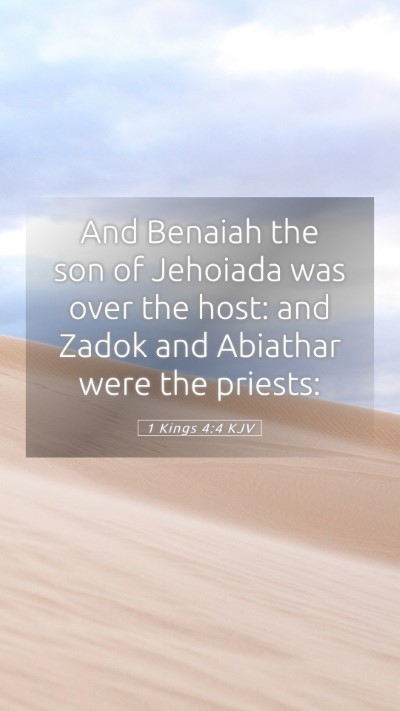Bible Verse Meaning: 1 Kings 4:4
In 1 Kings 4:4, we find a critical insight into the leadership structure and governance during King Solomon's reign. The verse reads: "And Benaiah the son of Jehoiada was over the army: and Zadok and Abiathar were the priests." This verse highlights the pivotal roles played by Benaiah, Zadok, and Abiathar, each contributing to the stability and order of Solomon's kingdom. Below, we will explore the verse's deeper meanings, interpretations, and applications based on insights from public domain commentaries.
Verse Analysis and Commentary
Understanding the Characters Mentioned
Benaiah: As the head of Solomon's army, Benaiah represents courage and military prowess. His appointment illustrates Solomon's reliance on capable leaders to maintain authority and security within the nation. Matthew Henry emphasizes his valor and the importance of military leaders in times of peace and war.
Zadok and Abiathar: The two priests exemplify the spiritual leadership of Israel. Zadok, who belonged to a lineage that served in the tabernacle, is noted for his loyalty to Solomon, whereas Abiathar, who was exiled due to his support of Adonijah, highlights the political struggles within the priesthood. Adam Clarke points out the contrast between their roles and how it reflects the broader tensions in Israel's leadership during Solomon's reign.
Significance of Leadership Structures
This verse provides insight into the essential components of effective governance, integrating military, spiritual, and administrative leadership. Albert Barnes notes that such arrangements were crucial in ensuring that Solomon's reign was characterized by peace and prosperity, reflecting a well-ordered society.
Spiritual and Political Unity
1 Kings 4:4 also signals the alignment of military and spiritual leadership, which is vital for a nation’s success. The collaboration between Benaiah, Zadok, and Abiathar is emblematic of how spiritual guidance underpins political authority. Matthew Henry stresses that the strength of a kingdom often relies on the harmony between church and state.
Lessons for Modern Application
When interpreting this verse, contemporary readers can consider its application in today's world. The passage encourages individuals to reflect on the importance of wise leadership that balances authority with responsibility. It serves as a reminder that both spiritual and temporal leaders must work in unison for the common good, a principle that remains applicable in various modern contexts such as Bible study groups, online Bible study, and across Bible study resources.
Cross References
- 2 Samuel 20:23: discusses the military leaders of David’s reign.
- 1 Chronicles 18:15: further illustrates the roles of leaders during King David's time.
- 1 Kings 2:35: highlights the shifts in leadership and the establishment of new figures in Solomon’s court.
- Hebrews 7:11-12: relates to the priesthood and its significance in the greater plan of God.
Conclusion
1 Kings 4:4 serves as a profound reminder of the intertwining of spiritual and political leadership in biblical history. The characters discussed not only played their roles in the governance of Israel but also represent broader themes of authority, loyalty, and the importance of maintaining a harmonious balance between differing roles within a kingdom. For those seeking Bible verse interpretations, this passage encourages deep reflection on how biblical principles of leadership can guide contemporary practices in both faith communities and personal governance.


